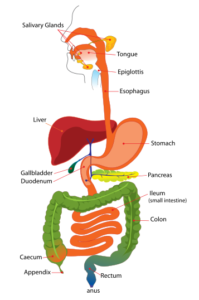 |
| Digestion |
| Digestion |
Why Digestion Is Important
Ayurveda believes a healthy stomach to be the basis of one’s health. Yet on the other hand, if the working of your stomach is hampered due to any reason, this results into evolution of a disease. This is because a disease manifests itself when there is diminished gastric fire, which further tends to cause improper digestion and assimilation of the ingested food.
The malady of indigestion, which is the basis of all other digestion ailments, is believed to result when there is a decrease in the gastric fire. According to Ayurveda, the disease is caused when there is a distortion or imbalance in either of the
three doshas or the body humors viz. air, fire, or phlegm:
· In distortion of Vata, or air, the apparent symptom is pain in the abdomen and excessive wind formation.
· In distortion of the Pitta, or heat, there is a burning sensation accompanied with sour eructation.
. When there is increase in the Kapha dosha, or phlegm, the prime symptoms are nausea and vomiting.
| Digestion |
Effective Ayurveda Tips for Boosting Digestion
Some regulations relating to intake of food have been suggested in Ayurveda to guarantee step up in digestion:
· One should eat to one’s capacity. Overeating can lead to a number of lifestyle-related ailments.
· A simple rule suggested for judging your capacity is to divide your stomach hypothetically into four parts. Of these, two parts are to be filled with solid food, one part with liquid. The fourth part is to be kept empty for the proper movement of gases.
· The foodstuffs taken in routine should be nourishing as well as easily digestible. The vegetarian food is given preference to the non-vegetarian items.
· The food should be freshly cooked, pleasing, tasty, and taken in agreeable ambiance.
· Immediate exercise in any form after the intake of food is to be avoided. The night meals should be taken two to three hours before sleep.
· The food should never be taken in hurry. Proper mastication of every morsel is a must. It is well said: Never eat the food, but always drink it.
· Taking food during mental states of worry, anger, or stress could cause more harm than good.
· Seasonal fruits and vegetables with lots of fibre, herbs and condiments generally used in our Indian kitchens, whole-wheat preparations, unpolished cereals, saindhav salt, cow’s milk
. desi ghee (clarified butter), honey, etc. are largely recommended.
· Also, it is very important that food is taken only when you are hungry, because the sign of hunger indicates proper digestion of the previous meal.
Dr Sonica Krishan is Author and Speaker in Healthy and Joyous Living through Ayurveda, Meditation, Yoga and other Contemplative practices. She is a leading Ayurveda Professional in India. She is also Health Writer, Columnist, Editor, Ayurveda Consultant at Herboveda and Holistic Healing Coach. Dr Sonica is open for National as well as International Collaborations with interested people / institutions in fields of Ayurveda, Meditation and Yoga.
Related Posts:
